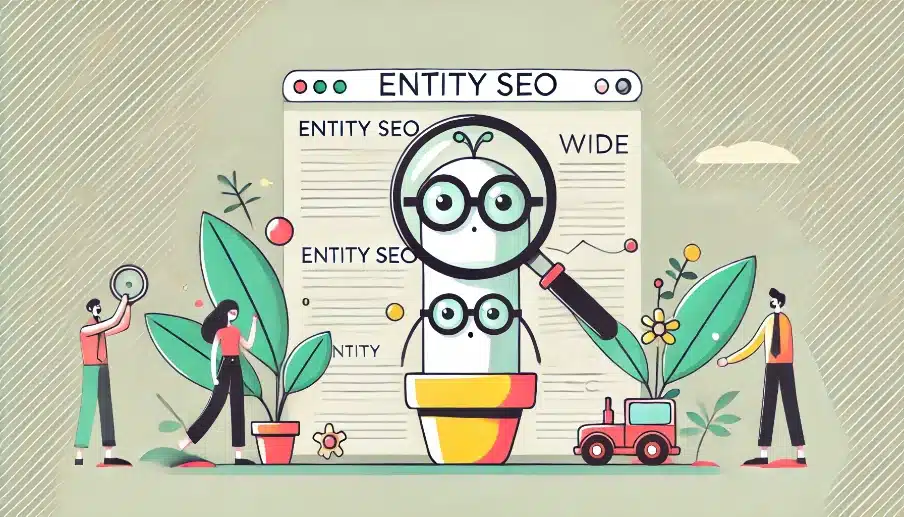You’ve been hearing about SEO for ages. Keywords, backlinks, content optimization—blah blah blah. But the thing is, Google’s moved on from keywords to something more powerful. Meet the future: Entity SEO.
Stuffing your content with keywords? That’s old news. Google isn’t counting keywords—it’s figuring out what your content means and how it connects to everything else.
Let me break it down for you.
Why Google Prefers Entities Over Keywords
SEO pros have been obsessing over keywords for years—but Google’s been playing a whole different game behind the scenes. It’s not about exact matches anymore; it’s about understanding meaning. Google’s shifting from keywords to entities—the actual things that matter—because context and relationships are more valuable than just matching strings of words.
So, what’s an entity? It’s basically anything Google can identify and categorize—a person, place, brand, product, concept, or event. And the cool part? Google doesn’t care how you describe it. Whether you search for Shure MV7, best podcasting microphone, or Joe Rogan’s mic setup, Google knows you’re talking about the same thing.
That’s because of the Knowledge Graph—Google’s massive database of entities and how they’re connected. It’s what allows Google to understand that “Shure MV7” is a product entity, made by the company Shure (an organization), often used in podcasting (a creative work) by influencers like Joe Rogan (a person). The more your content reflects these relationships, the easier it is for Google to connect the dots—and the higher you’ll rank.
How BERT and MUM Help Google Understand Entities
Google’s shift to entity-based search was made possible by two major AI advancements: BERT and MUM.
- BERT allows Google to understand the context and intent behind a search query rather than just matching words.
- MUM takes it a step further by processing text, images, and even video to understand the bigger picture behind a query.
For example, if you search for “best microphone for podcasting,” BERT helps Google understand that you’re looking for advice rather than a product listing. If you upload an image of a microphone, MUM can cross-reference it with known entities to give you product recommendations.
Mastering Entity SEO means understanding how BERT and MUM connect entities to user intent—this is where semantic relationships become key.
Why Entities Matter for SEO
Entities are what turned Google from a basic word-matching machine into a smart search engine that actually understands intent and context.
Google isn’t just scanning for keywords anymore—it’s trying to figure out what the search is really about and how different pieces of information are connected. When someone types in a query, Google’s not thinking, “Which page uses these words the most?” It’s asking, “What’s the underlying meaning here?” and “What entities are most relevant?”
Example:
If someone searches for “best podcast microphones,” Google isn’t just looking for the phrase “podcast microphones.” It’s analyzing entity relationships—like the fact that the Shure MV7 and Audio-Technica ATR2100x are popular microphones used in podcasting. And since Joe Rogan is a well-known podcaster who uses the Shure MV7, that connection strengthens the relevance.
If your content mentions these entities, explains how they’re connected, and provides valuable context, you’ve got a better shot at ranking higher. Google’s not just rewarding word matches anymore—it’s rewarding meaningful connections.
Types of Entities and How Google Classifies Them
Not all entities are treated equally by Google. Entities are classified into several major types:
- Person – Joe Rogan, Elon Musk
- Place – New York, Silicon Valley
- Organization – OpenAI, Shure
- Event – CES 2025, Google I/O
- Creative Work – Podcasts, YouTube videos
Why does this matter? Because when you create content, aligning with Google’s entity classification increases your chances of ranking. If you write about “Shure MV7,” Google knows it’s a product entity made by an organization (Shure) and related to a creative work (podcasting).
The more accurately you align your content with entity classifications, the easier it is for Google to position you in search results.

The Power of the Knowledge Graph
Google’s Knowledge Graph is like a massive web of information where all these entities live—and if you want to rank higher, you need to get your content tangled up in that web.
How? By mentioning entities that Google already recognizes—things like popular products (Shure MV7), influencers (Joe Rogan), and related terms (podcasting equipment). The more connections Google can make between your content and its existing knowledge base, the more relevant and trustworthy your content looks. And relevance = higher rankings.
Ever seen that Knowledge Panel pop up on the side of the search results? You know, that box with all the key facts about a person, product, or brand? That’s the Knowledge Graph flexing its muscles. When Google pulls info into a Knowledge Panel, it’s because the entity is well-defined and deeply connected. You want to be part of that club—and entity SEO is how you get there.
How to Optimize for Entity SEO
Alright, so how do you optimize for entities instead of keywords? Let’s not overcomplicate it.
How to Measure Entity SEO Performance
Once you’ve optimized for entities, how do you know it’s working?
✅ Google Search Console – Check your performance for related queries and Knowledge Graph appearances.
✅ Market Brew & InLinks – These tools can tell you if Google is recognizing your content as an entity.
✅ CTR and Bounce Rate – Higher relevance to entities = better match for user intent, so CTR and time-on-page should increase.
✅ Featured Snippets – If your content starts appearing in featured snippets, it means Google recognizes it as highly relevant to the entity.
Track these metrics over time. If you’re consistently showing up in searches where entities are involved, you’re on the right track.
Use Schema Markup
Schema sounds technical, but don’t sweat it—it’s not as scary as it sounds. Think of it as a way to give Google a cheat sheet about your content. It’s structured data you add to your HTML so Google knows exactly what your page is about and how it fits into the bigger picture.
- Writing about a product like the Shure MV7? Use Product Schema to tell Google the brand, model, specs, and reviews.
- Answering common questions? Add FAQ Schema so your content shows up in those “People Also Ask” boxes.
- Comparing products or services? Use Comparison Schema to give Google clear details on what’s being compared.
Schema markup helps Google connect your content to the right entities in the Knowledge Graph—which means better relevance, higher visibility, and more chances of landing a featured snippet.
Build Contextual Links Between Related Entities
You’re not just writing about the Shure MV7; you’re writing about USB microphones, podcast quality, and even beginner podcasting setups. Tie all those things together in your content. This isn’t keyword stuffing—this is context building.
How to Build Entity Relationships with Contextual Linking
Context is key. When you mention “Shure MV7,” don’t leave it hanging—connect it with related entities like:
- Joe Rogan – Mention that he uses the Shure MV7 in his podcast setup.
- Podcasting Equipment – Include a comparison to other popular mics like the Audio-Technica ATR2100x.
- Microphone Buying Guide – Link to other content that expands on choosing the best mic for podcasting.
Google’s Knowledge Graph is built on these connections. When your content reinforces existing relationships between entities, Google sees it as more relevant and authoritative.
Build Authority
Google doesn’t treat all websites equally—it’s got its favorites. If you’re getting links from trusted, high-authority sites that are also mentioning the same entities you are, you’re in good company.
Think about it: If you’re writing about the Shure MV7 and getting backlinks from sites like The Verge or CNET (both trusted tech sources), Google sees that as a major vote of confidence. It’s like hanging out with the cool kids—if they trust you, Google will too.
Authority isn’t just about backlinks, though. If reputable sources are reinforcing the same entity connections you are, it strengthens the credibility of your content. And when Google sees you as an authority on a topic, you’ll rank higher—and stay there.
Examples of Successful Entity SEO (Real-World Case Studies)
Let’s not just talk theory—plenty of businesses are already making bank with entity SEO.
Take Wirecutter, for example. Their articles are loaded with specific product entities like Shure MV7 and Audio-Technica ATR2100x—but it’s not just name-dropping. They’ve mastered structured data, using Product Schema and Comparison Schema to help Google understand exactly what they’re reviewing and how it fits into the broader context of podcasting gear. The result? Their content shows up in rich snippets and consistently dominates the SERPs for product reviews.
Or look at Healthline—they’ve basically turned entity SEO into a science. They rank for complex medical topics because they don’t just mention “diabetes”—they connect it to related entities like Type 2 diabetes, insulin, and blood sugar management. They also reinforce credibility by linking to trusted sources like the Mayo Clinic and WebMD. That’s how you build topical authority and entity relevance at scale.
Google’s already rolling out the red carpet for these guys because they’ve built the right entity connections—and that’s exactly how you win the SEO game in 2025.
How to Research and Identify the Right Entities for Your Niche
Okay, you get the point—entities matter. But maybe you’re wondering, How do I actually find these magical entities for my content? Here’s how you start:
- Google’s Knowledge Panel:
Look up competitors or top results in your niche and see what entities pop up in Google’s Knowledge Panel on the right-hand side of the search page. If Google is treating them like royalty, you should be mentioning the same entities in your content. - Wikidata:
Head over to Wikidata.org and search for well-known terms in your industry. You’ll find entity connections and related data. Think of Wikidata as Google’s nerdy cousin that knows everything about everything. - Google Trends:
Use Google Trends to find trending entities in your industry. Search for popular topics, and it will suggest related entities that could be valuable for your content. Pro tip: Pay attention to spikes—those are the entities everyone’s talking about. - Semantic SEO Tools:
Use tools like Market Brew or InLinks to help extract relevant entities from your content and discover what’s trending in your niche. They can save you time and help you find connections you didn’t even know existed.
The Future of SEO is Entity-Driven
If you want to future-proof your SEO game, stop thinking in terms of just keywords and start thinking entities. Google’s AI, like ChatGPT and all the fancy language models, thrives on entities. They’re easier to understand and connect with other things than just random keywords thrown together.
Plus, entities are language-agnostic. Whether someone searches for Shure MV7 in English or Spanish, Google knows what they mean. It’s all about the thing, not just the word.
How Entity-Based Search Intent Works
Google doesn’t just match entities—it understands the intent behind the query.
- Informational Intent: If someone searches “What is the Shure MV7?”, they expect an informative answer.
- Transactional Intent: If they search “Buy Shure MV7,” Google will prioritize product pages with product schema.
- Comparative Intent: If they search “Shure MV7 vs Audio-Technica ATR2100x,” Google will favor content that compares the two entities directly.
Understanding search intent helps you create content that aligns with what Google is trying to deliver.

How You Can Crush It with Entity SEO (Right Now)
You don’t need a PhD in data science to start winning with entity SEO. You just need to adjust your mindset from “what words do I need to rank for?” to “what entities do I need to mention?”
- Use Schema: Don’t skip this. It’s not hard to implement, and it makes a big difference. Think of it like waving a flag in front of Google saying, “Hey! This is important.”
- Connect the Dots: Mention entities that are relevant to your topic, and show how they relate to each other. Don’t just mention Shure MV7—talk about how it’s used by top podcasters, and how it compares to other mics like the Audio-Technica ATR2100x.
- Write Like a Pro: Forget keyword stuffing. Create content that actually helps people, answers their questions, and ties in relevant entities naturally.
Take Your SEO to the Next Level with Entity Optimization
Entity SEO is already changing the game—don’t get left behind. If you’re still stuck on keywords, you’re missing the bigger picture. Start by identifying the key entities in your niche and aligning your content with Google’s Knowledge Graph.
✅ Add schema markup to make it easier for Google to recognize and connect your content.
✅ Build contextual links between related entities to strengthen relevance.
✅ Focus on authority signals by earning links from trusted sources in your industry.
Not sure where to start? Do a quick entity audit on your top pages today. Identify the entities you’re already mentioning—and the ones you’ve missed. The more dots you connect, the higher you’ll rank.
Author
-
Alex started his career creating travel content for Jalan2.com, an Indonesian tourism forum. He later worked as a web search evaluator for Microsoft Bing and Google, where he spent over a decade analyzing search relevance and understanding how algorithms interpret content. After the pandemic disrupted online evaluation work in 2020, he shifted to freelance copywriting and gradually moved into SEO. He currently focuses on content strategy and SEO for finance and trading-related websites.
Recent Posts






